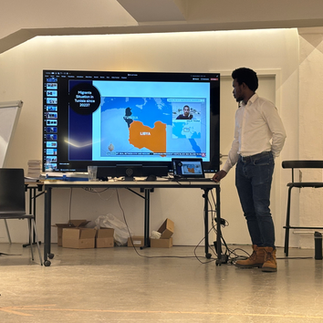From Tripoli to Berlin
- Refugees in Libya

- Nov 6, 2024
- 6 min read
Summary of the Berlin event | October 18-19, 2024

Launched by the beginning of 2024 in order to evacuate People on the Move from Libya to Europe, the Human Rights Defenders campaign has finally arrived in Germany. After Geneva, Brussels, Bologna, Rome, Lampedusa and Tortosa, the "From Tripoli to” series of events took place, on October 18-19, in Berlin hosted by the European Center for Constitutional and Human Rights (ECCHR) and the Rosa-Luxemburg-Stiftung (RLS).
The event was split into two days: Friday’s panel titled “Evacuation, not Externalisation! The Right to Move against an EU for the Few" and Saturday fully dedicated to three different workshops.
Representatives from Refugees in Libya (RiL), Alliance with Refugees in Libya (ARiL), ECCHR, the German Member of Parliament, the Civil Fleet and individuals came together with the goal to cast light on the current situation of refugees and migrants in Libya and offer new solutions for evacuation mechanisms in Germany.
Mobile Exhibition
A centerpiece of the campaign is the Mobile Exhibition, which showcases written and video testimonies from detainees at Ain Zara and Human Rights Defenders in Libya. This powerful collection documents the repression faced by protesters and their ongoing struggle for better treatment.
The exhibition curated by Sophia Igel (ARiL) is designed to travel to various cities in order to promote the evacuation campaign and raise awareness towards the human rights violations in Libya: a live proof of the stories and traumatic experiences of the human rights defenders that should reach places they themselves cannot reach in person.
Rosa Luxemburg Stiftung | 18 October | 18:30 “Evacuation, not Externalisation! The Right to Move against an EU for the Few”
The panel discussion was inaugurated by Tanja Tabara’s (RLS) foreword and then introduced by Dorina Achelaritei (ARiL), one of two moderators, who explained the meaning of the event in this very particular moment for Germany characterized by a harsh anti migration discourse in the media and the restriction of freedom of movement operated by the AmpelKoalition - officially as a response to the attacks of Solingen.
The painful truth is that the European migratory policy has been a constant progress of human rights violations at land and at sea, externalization of borders and financing of Northafrican as well as Sub Saharan States.
Therefore it is important - now more than ever - to be vigilant and show solidarity towards the Human Rights Defenders still resisting in Libya as Naeima Yaqoub (RiL), co-moderator, reminded the audience, while also emphasizing the relevant role of European activists: “Please don’t underestimate the importance of you being here and what it means for our brothers and sisters in Libya”.

David Yambio (RiL) reveals what made the ongoing demand for evacuation so enduring, as highlighted by the historic 100-day sit-in protest led by RiL in Tripoli in 2021: “Today as Refugees in Libya we are here thanks to these two main reasons: imagination and determination”. It was only our imagination that gave us the strength to believe in our voices as a bridge in the Mediterranean instead of a cemetery as it is today”. If the imagination becomes a dream, the dream becomes a belief able to resist and overcome every sacrifice as we can hear directly from the testimonies’ voice who sent us their videos: “We as Human Rights Defenders in Libya face problems, we have been kidnapped by the militias and charged with no evidence. They execute the raids randomly. Every 500 meters you can find a checkpoint and you can expect to be arrested and locked anytime”.

The need for accountability of Libyan as well as European institutional and political representatives was at the center of Allison West’s (ECCHR) speech: “We use the law to charge and seek accountability for crimes and human rights violations against People on the Move in Libya and in the Mediterranean”. At the same time she recognizes the importance of understanding the full picture in order to operate in a multidisciplinary way: “Criminal law is a broad struggle, we as lawyers see us as one part of the struggle, as one of the tools for the common cause”.
As expressed by Mirka Schäfer’s (SOS Humanity), the migration “problem” is never a problem, but a matter of political will: “The extraordinary reception of Ukrainian refugees in Europe was solved in a few days through the suspension of the Temporary Protection Directive, providing immediate and temporary protection.
For the entire duration of the protection more than 5 Million persons had access to residence permits, labor market, housing, social assistance, medical care etc without overburdening the national asylum systems.
“I have been visiting the Libyan Coast Guard and it is clear that they keep receiving funds from the EU, that they expect this to be the way it works” said Julian Pahlke (Bundestag, Die Grünen) who then adds “I was not allowed to enter the detention centers”.
Yambio intervened explaining the inhumane UNHCR mechanisms and attitudes towards People on the Move and reminding the over 20,000 persons incarcerated in Libya detention centers financed by the European State Members: “How can you not have the authority to access these sites?”. When questioned by Achelaritei about new evacuation possibilities to Germany, the German Parliamentarian offered the resettlement as a solution.
Following the panel, attendees were invited to a reception, where they could view a mobile exhibition about the Refugees in Libya movement and continue discussions in a more informal setting.
European Center for Constitutional and Human Rights | 19 October
WORKSHOP 1 | 11:30-13:00
Collective Hotline: Limits and perspectives of an indispensable tool
The first workshop centered on the Hotline, a vital resource designed to address the immediate needs of displaced individuals. Over the course of just 10 months, this activist-run hotline became overwhelmed with information regarding thousands of refugees stranded in Libya, Tunisia and even Niger.
Many of these persons are trapped for months, if not years, in Libya, unable to return home or escape to safer countries, easy prey to a systemic exploitation including forced labor, sexual violence, and arbitrary detention. Despite operating with limited resources, the hotline succeeded in establishing a crucial connection to those beyond the borders of Fortress Europe and to preserve their names and their testimonies.
The first part was held by Raya Cohen (ARiL) who explained how the Hotline works, the main challenges the shift takers are faced with as well as the need to re-politicise the narrative about refugees in Libya, as part of the fight against the EU border regime. Elena Tomassoni (OnBorders) presented a few specific cases along with the solutions provided. David Yambio (RiL) then showed the role played by the videos and testimonies of the refugees in Libya and Tunisia within the international media such as The Guardian and Al Jazeera.
WORKSHOP 2 | 14:00-15:30 Accountability avenues and challenges for international crimes against people on the move in Libya
ECCHR’s session was aimed at exploring legal pathways to achieve accountability for international crimes, particularly crimes against humanity, committed against migrants and refugees in Libya.
The workshop began by trying to define justice and accountability from different perspectives, not only from the legal point of view.There were group discussions and exchanging perspectives on the meaning of accountability and justice for people on the move in Libya and the Central Mediterranean, as well as those in solidarity with them. This initial conversation served to establish a foundation for the subsequent dialogue on the potential limitations of legal approaches in addressing these issues.
Representatives from ECCHR then presented an overview of their experiences, highlighting both successes and challenges encountered in pursuing legal accountability. They presented their efforts before the International Criminal Court (ICC) and various other judicial bodies, providing insights into the complexities of international legal processes.
The latter part of the workshop engaged participants in a collective brainstorming session. Attendees worked together to identify strategies for overcoming current obstacles in the pursuit of justice. They also explored possibilities for new legal interventions that could bring their visions of justice and accountability closer to reality.

WORKSHOP 3 | 16:00-17:30 Fighting for Freedom of Movement: Connecting struggles and exchanging strategies
The third and last workshop - held by Hagen Kopp, Riccardo Mattone Fantini and Tiziano Schiena (ARiL) - was aimed at discussing the evacuation campaign initiated by the end of January 2024, as well as the role of sea rescue in fostering freedom of movement. After reviewing together the stages of the evacuation campaign that began in Bologna at the beginning of the year and providing an update on the current progress of work in Italy, the presentation focused on the possibilities of involving German cities, despite the political climate in Germany.
Contact us:
E-mail refugeesinlibya@gmail.com

























Comments